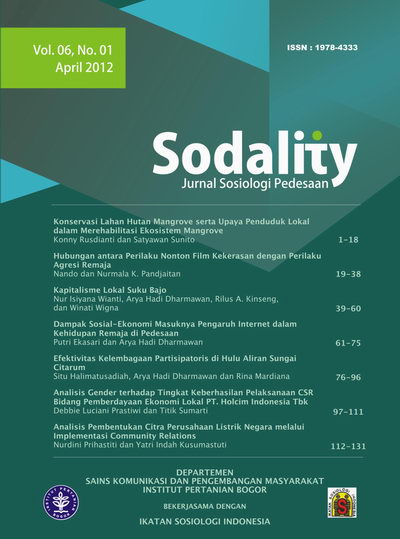Mangrove Forest Conservation and The Role of Local Community in Mangrove Ecosytems Rehabilitations
Abstract
Mangrove ecosystem has many benefits both ecological and economic terms because of the mangrove ecosystem is one that has an important role in efforts to make use of sustainable coastal and marine resources. Various alternatives can be made to the management of mangrove forests in accordance with the necessities of life, their ability and their views or perceptions of mangrove forests. But there are still errors in the use of mangrove ecosystems, such as exploiting the mangrove forest and convert it into ponds, residential, agricultural land, and so forth. Various activities are causing widespread decline in mangrove forests and also resulted in decreased function and mangrove benefits for residents and the surrounding environment. To restore function of damaged mangrove and benefits, it is necessary to the management efforts through the rehabilitation and conservation of mangroves. This study aims: (1) Reviewing the chronology of mangrove conversion into ponds that occur in the Village Karangsong, Indramayu District, Indramayu District, (2) Knowing the actors and their respective roles in the conversion process and the actors in the rehabilitation and conservation of mangroves, (3) Analyze perceptions of local residents towards the rehabilitation and conservation of mangroves and to know the perspective of rehabilitation and conservation activities in the conversion of existing conditions, (4) Knowing the shape and development of resident participation in mangrove rehabilitation efforts. The results showed that the conversion of mangrove was originally introduced by settlers from the Losari District, Cirebon. Over time, indirectly Karangsong Village residents to observe and study the fish farming in ponds, and also facilitates the Village Government Karangsong arise in the mangrove area of ??land to be used by residents as fishponds. The continued development of aquaculture fish and shrimp in the pond, the conversion of mangrove area also do so causes a decrease in mangrove forest area and also resulted in decreased function and mangrove benefits for residents and the surrounding environment. Growing mangrove destruction, making some local residents are aware and take the initiative to form a group that deal with rehabilitation of mangrove on the basis of consciousness that is one of the mangrove ecosystem plays an important role in the ongoing effort to make use of coastal resources, the sea and the surrounding residents. Most of the perceptions of respondents in the category of "Medium" is the perception by the number of scores obtained from scoring high in doubt of the existence of mangrove rehabilitation in conversion of the existing conditions in the Karangsong Village. It can affect their initiative to participate in rehabilitation activities. Village regulations regarding the management of mangrove protection areas are not so clearly known to the respondent. Of the 34 respondents interviewed, nearly all do not know what the Village Regulations
Published
2012-04-14
How to Cite
RusdiantiK., & SunitoS. (2012). Mangrove Forest Conservation and The Role of Local Community in Mangrove Ecosytems Rehabilitations. Sodality: Jurnal Sosiologi Pedesaan, 6(1). https://doi.org/10.22500/sodality.v6i1.5815
Section
Articles
Authors who publish with this journal agree to the following terms:
- Authors retain copyright and grant the journal right of first publication with the work simultaneously licensed under a

This work is licensed under a Creative Commons Attribution 4.0 International License. that allows others to share the work with an acknowledgement of the work's authorship and initial publication in this journal. - Authors are able to enter into separate, additional contractual arrangements for the non-exclusive distribution of the journal's published version of the work (e.g., post it to an institutional repository or publish it in a book), with an acknowledgement of its initial publication in this journal.
- Authors are permitted and encouraged to post their work online (e.g., in institutional repositories or on their website) prior to and during the submission process, as it can lead to productive exchanges, as well as earlier and greater citation of published work (See The Effect of Open Access).





.png)









